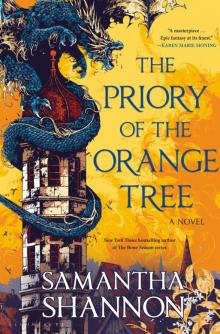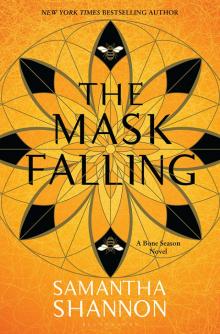- Home
- Samantha Shannon
The Pale Dreamer
The Pale Dreamer Read online
The Pale Dreamer
BY THE SAME AUTHOR
The Bone Season
The Mime Order
The Song Rising
The Pale Dreamer
A Bone Season Prequel
Samantha Shannon
Contents
By the Same Author
Chapter 1 The Grisly Case of Anne Naylor
Chapter 2 Follow the Money
Chapter 3 Exit, Pursued by a Poltergeist
Chapter 4 No Rest for the Damned
Epilogue
A Note on the Author
Also by Samantha Shannon
The Grisly Case of Anne Naylor
London, 2056
If you were to ask me what I liked most about being an up-and-coming criminal in the year 2056, I’d probably point you to the simple things. Drinking coffee before daybreak in the den, listening to the capital stretch itself awake around me. Sitting beneath the blossom tree in the courtyard and leafing my way through a stack of forbidden novels. Sneaking into Jaxon’s room to listen to blacklisted music.
Strange, I know. It wasn’t as if I couldn’t have done things like that before I was employed by Jaxon Hall. Maybe not the blacklisted music and forbidden novels, but I could have found a tree to read by, or made coffee before daybreak, under other circumstances. They were ordinary moments in my newly extraordinary life – and they, in turn, became extraordinary.
As a dreamwalker, I was meant to be a great clairvoyant; a rare one, at least. Jaxon was certain that I was hiding spectacular powers; that I could leave my body, possess other people, and dance them around like mindless puppets if I so desired. But after three months in his employ, I still couldn’t do it. Not for want of trying, I should add – I just didn’t know how, and nobody agreed on how to teach me.
I first learned of the grisly case of Anne Naylor in October of that year. One Monday afternoon found me in the ‘office’ in our den, where an old oak desk was piled with paperwork. The den was a three-storey maisonette on Monmouth Street in the small district of Seven Dials. It had three permanent residents – me, Jaxon and Eliza. Nick had his own apartment, but he often stayed with us.
Since I had moved in, I had come to love the den. It was cluttered and dusty and the boiler was useless, but that only made it feel snug and lived-in. Jaxon had gifted me my own room and told me to do as I pleased with it, so I had painted it wine-red and filled it with trinkets from the black market, where I hunted for antiques and curios in the evenings. It was nothing like my room in my father’s sterile, ultra-modern apartment, which the government had given him.
Thinking of my father let a butterfly loose in my stomach. After I had left school, I had told him I was living with a friend, looking for a job in the service industry. He was still disappointed that I had decided against applying for a place at the University.
He would be even more disappointed if he knew the truth.
I tapped my pen against the ledger. Jaxon had asked me to find out who in the district hadn’t paid their rent, and how much they owed. Mind-numbing work. Not like what Eliza and Nick got to do. Those two were always out hunting spirits or confronting rival clairvoyant gangs – the sort of thing I had envisioned doing when Jaxon had first invited me to join his gang, the Seven Seals. They had worked for him longer than I had, but I still felt impatient – mostly with myself. I longed for an assignment of consequence; something that would really test me.
Not that I would ever ask for it outright. Jaxon Hall could be courteous, even charming, but he was mercurial. Pressing him at the wrong moment could make me look ungrateful for the work, and I couldn’t lose this job. I got the feeling that if you were exiled from the voyant underworld, you wouldn’t come back.
I couldn’t take that gamble. Now I knew this world existed, I would not risk being banished.
My eyelids were heavy. I glanced up from the figures, massaging the sore base of my neck.
The sun was low and copper-gold. Ensconced in here, it was easy to forget that our beloved government could have me hanged if they ever learned what I was – an unnatural. That was what they called clairvoyants.
I sat up straighter and adjusted my jersey when I saw Eliza through the window. She was flushed and bright-eyed, her hair unsettled by the wind.
Eliza Renton was twenty years old and had worked for Jaxon for over a year. From what I had observed about her – I did a lot of observation in between rounds of paperwork – she was both street-smart and absent-minded; a dressmaker, an artist, a voyant. Today she wore a silk dress, the same light green as her eyes, covered by a velvet coat. She had braved the cold to get us lunch, saying she had an errand anyway and I deserved a break from the endless food-and-coffee runs – but her hands were empty.
‘No caffeine?’ I said as she came up the stairs. But she was already gone, her face set. ‘Eliza?’
‘Jaxon!’
Her boots clicked on the stairs at speed. I deserted my post and followed her. Any excuse. By the time I reached the second-floor landing, she was knocking on the door to Jaxon’s study. She was all nervous energy, tilting her weight from one foot to the other.
The door creaked open. Jaxon Hall stood in his lounging robe, his black hair free of the oil he often used to smooth it back.
‘Did you bring that coffee, darling?’ he asked. There were greyish circles under his eyes.
‘I hate myself for saying this,’ Eliza said, ‘but we don’t have time for coffee.’
She slipped past him. I entered next, giving him a ‘no idea’ look. He twirled a burning cigarillo between his fingers.
I wasn’t sure what to make of Jaxon. I wasn’t even sure whether or not I liked him. All that was clear was that my employer was a man with secrets. He was eccentric, to say the least, and intimidating, with a smirk that promised mayhem and milk-blue eyes that saw through everything. Feared and loved in equal measure, he was the most famous mime-lord in the underworld – so Nick said, anyway.
As head of the gang, Jaxon had the best room in the building. It boasted large sash windows, an antique desk, a record player, a stained-glass lamp, bottles of absinthe, and shelf upon shelf of black-market books and ornaments. Nick was already here, lying sprawled on the chaise longue.
Nick Nygård was Jaxon’s mollisher, or second-in-command. He was the one who had uprooted me from my old life, introduced me to Jaxon, and welcomed me into this existence.
‘Afternoon.’ He rubbed his eyes. ‘Hey, sötnos.’
He had started calling me that a while ago. It meant ‘sweet nose’ in Swedish. I thought it was lovely. Nick in general was lovely.
‘Hey,’ I said.
Eliza threw herself down beside him, shunting his legs off to make room.
‘Jaxon,’ she said, fighting for breath, ‘one of our couriers just caught me at the black market – asked me to get word to you straight away. He said Didion Waite—’
‘It can’t be too dire if it involves Didion Waite, my dear. He’s a clown.’ Jaxon glanced at me. ‘Paige, some tea may be in order.’
Normally I would have asked how many sugars – his preference changed almost every day. Instead, the frustration I had felt for the last three months pooled like lava behind my ribs and bubbled up to my throat, and what came out was:
‘I’d like to stay.’
Jaxon’s eyebrows jumped towards his hairline.
All the heat inside me froze.
He was going to turf me out. I would have to go back to my father. I would never learn how to use my gift. It would eventually surface, and I would have no idea how to hide or control it. I would end up on the gallows before I turned seventeen. Death by reason of being too proud to make four cups of tea. Death by tea.
‘Eliza,’ Jaxon s
aid, not taking his eyes off me, ‘continue.’
Quietly, I breathed again.
‘You know Didion’s been looking for valuable spirits to auction? Well, he only went and found Sarah Metyard,’ Eliza said. Jaxon became very still. ‘He hired someone to bind her, but they bungled it and set her off. She’s on a rampage.’
Jaxon leaned back in his chair and appeared to fix his full attention on a crack in the ceiling.
‘A rogue poltergeist,’ he said. ‘Oh dear, oh dear. Didion, what have you got yourself into?’
We sat in apprehensive silence for a while. Finally, Jaxon breathed in deeply, stood, and took the stairs to the top floor. Nick and Eliza swapped worried glances.
I cleared my throat.
‘Sorry,’ I said, ‘but who’s Sarah Metyard?’
Nick chuckled. ‘I keep forgetting you’ve only been here five minutes, Paige. You must have questions upon questions.’
He motioned for me to join them. Eliza nodded her encouragement, though she looked wary. I had always suspected she hadn’t wanted there to be any more members of this tight-knit family. I perched on the chaise longue beside Nick, trying not to notice his proximity.
‘You know what a poltergeist is, don’t you?’ Eliza said to me.
‘A violent kind of breacher – a spirit that can make contact with the physical world.’
‘That’s it. Poltergeists are extremely dangerous, as they can cause physical harm – but they’re also rare in comparison to other spirits, and hard to catch, so they sell for a lot of money.’
Nick caught my eye. He knew how familiar I was with poltergeists, even if Eliza didn’t. He took a file marked M from her, which she had drawn from a bookshelf beside the desk.
‘The spirit of Sarah Metyard has been around for a few centuries,’ Nick said. ‘Metyard was hanged for the murder of a young girl named Anne Naylor – one of her apprentices – in 1758.’
I steeled myself to hear more. ‘Why would she murder her own apprentice?’
‘Naylor’s death was an accident, but it was the result of extreme neglect and cruelty.’ With a puckered brow, he opened the file. Inside were witness accounts, yellowed eighteenth-century maps of London, death records, transcripts. I scanned them. ‘Metyard and her daughter, who was also called Sarah—’
‘But went by Sally,’ Eliza chipped in. ‘She was also a victim of her mother’s brutality. Didn’t stop her meting out cruelty on the girls in their care, though. Anyway, Sarah and Sally—’
‘—were either milliners or haberdashers, or both. Several girls from local workhouses were apprenticed to their business. One of them was called Anne Naylor, or Nanny.’
I listened closely, trying to remember every detail.
‘The girls were all treated badly, but Anne had a weak constitution,’ Eliza said. ‘She couldn’t work as fast as the other apprentices, so she became the focus of the Metyards’ contempt. Sarah never fed her enough, worked her to exhaustion, neglected her – the poor girl even had to have a finger removed after an abscess went bad, presumably because they didn’t get it treated.’ Eliza licked her own finger and turned a page in the folder. ‘She escaped twice, but they caught her. As punishment for her second escape, they beat her, tied her to a door, and left her there without anything to eat or drink. After a few days of this, the other apprentices called Sally in a panic.’
My gaze fell to the page, reading exactly what they had said. I could almost hear their frightened voices.
On the fourth day she faltered in speech, and presently afterwards expired. The other girls, seeing the whole weight of her body supported by the strings which confined her to the door, were greatly alarmed, and called out: ‘Miss Sally! Miss Sally! Nanny does not move.’ The daughter then came upstairs, saying: ‘If she does not move, I will make her move’; and then beat the deceased on the head with the heel of a shoe.
‘The Metyards tried to revive Anne,’ Eliza said, ‘but she was dead. She was thirteen.’
I should have been shaken, but I had heard too many stories like this over the past few months. Part of my education had been learning about the more famous spirits of the capital.
‘Of course, they tried to conceal Anne’s death,’ Eliza continued. ‘They claimed she’d run away and hid the body in a box in the attic for two months, but they couldn’t mask the smell of it for ever. Sarah Metyard removed and burned the hand with the missing finger, in case it could identify Anne, but decided not to risk burning the rest in case the neighbours got suspicious. Eventually, they cut up the body, and Metyard disposed of the pieces in a public sewer – a gully-hole, as they called it at the time.’
‘Some versions of the story say that they killed Anne’s eight-year-old sister Mary, who was also one of their apprentices,’ Nick said. ‘A watchman discovered the pieces of Anne’s corpse, but it was assumed that they had been dumped there by a body-snatcher or a surgeon, so nobody investigated.’
‘It seemed like they’d got away with it,’ Eliza said – she was clearly enjoying her role as a storyteller, ‘but as the years passed, Sarah grew more abusive towards her daughter. Sally finally went to live with a man named Richard Rooker, who had offered her employment. She moved away with him and became his lover, but Sarah wouldn’t leave them alone – she was obviously worried that Sally would tell someone about the murder. Eventually, Rooker overheard a confrontation between them, had a bad feeling about what he’d heard, and questioned Sally, who admitted everything. Rooker alerted the authorities, probably thinking Sally would get a lighter sentence, as her mother had done so much to influence her behaviour – but she didn’t. Both Metyards were hanged at Tyburn—’
‘—in 1768.’ Nick snapped the file shut. ‘The spirits of murderers often seek out those of their victims. I’ll wager that Sarah Metyard, now she’s been set off, is after Anne Naylor.’
I wet my lips. And only a few months ago, I thought that the dead stayed dead.
‘So,’ I said, trying to sound as if I found this all perfectly normal, ‘do you know where Anne is?’
Eliza reached for the N folder. ‘She became a poltergeist, too, and took up residence in Farringdon tube station. She’ll be frantic when she realises her killer is on the loose.’
‘She was “on the loose” before, wasn’t she?’
‘She was around, but poltergeists don’t usually become violent unless they’re disturbed. If you do disturb one, they tend to start visiting places that were important to them in life. Almost like they’ve been reminded that they’re dead.’
Before we could consider the matter any further, Jaxon blazed back down the stairs.
‘Paige, get me my pen. On the desk.’
Mild trepidation jolted in my stomach. There were at least eight pens on his desk.
Slowly, I stood. This had to be punishment for my little rebellion. Or was it a test of my clairvoyance? Was I supposed to know which pen he wanted? Shit. I made a snap decision and handed him a jewel-encrusted fountain pen, which I had seen him use before.
‘No. That,’ he said, ‘is my writing pen.’
Writing pen. Shit, shit. Was there any other use for a pen? Sweating, I offered a slightly cheaper-looking one. He shot me an indecipherable look before he took it.
‘First, we must deal with Didion. His incompetence is now a danger to us all,’ he said. ‘By creating a rogue poltergeist, he has broken syndicate law.’
It still amused me that criminals had laws. The clairvoyant syndicate flouted Scion law merely by existing, yet had its own justice system. Not a very effective one, but it was there.
‘Jax,’ Eliza said, ‘maybe we should just stay out of—’
‘No. We will hold Didion accountable for his misdeeds. You will go straight to Cheapside and order him to shut down that travesty of a business. And you will tell him to leave – yes, to leave this citadel once and for all, the ham-handed buffoon. He has forfeited his right to a place in this syndicate, and as such—’
‘We have no
authority to exile Didion, and you know it,’ Nick said calmly. ‘We’d have to get Hector involved.’
The reminder deflated Jaxon somewhat, but his eyes were still alive with ambition.
‘Of course.’ He lit another cigarillo. ‘Much as I dislike it, you are right. We would have to involve Hector.’ Slowly, he sank into his chair. ‘But . . . there is another option.’
I didn’t know enough about the politics of the underworld to intervene, but I listened. If I meant to have a clue what anyone was talking about, I would have to soak up everything I heard.
Jaxon drew an old-fashioned phone across his desk. Scion was thought to listen in to most communication; this had to be a secure line. He dialled and raised the receiver to his ear.
‘Get me Didion Waite,’ he said, with dangerous delicacy. ‘I demand that he speak to me personally.’ Pause. ‘The White Binder.’ His gaze flickered to us. ‘I think,’ he said, almost to himself, ‘that I can see a way to turn this to our advantage. We must get to Metyard before every fool in London tries to catch her.’
He flicked a switch on the phone. There was a rustle before a thick-nosed voice filled the room.
‘Jaxon.’
‘Didion,’ Jaxon said silkily. ‘How are you?’
‘Well enough.’
Both of their greetings dripped with contempt. I knew Didion Waite was Jaxon’s long-standing rival, but Nick had yet to tell me what had started the feud.
‘I suppose,’ Didion said, ‘that you somehow found out about Metyard. Who told you?’
‘Oh, I have eyes everywhere, Didion. Even in your district.’ Jaxon had an unnerving smile on his face. ‘I always had my doubts about your little auction house, but I was led to believe that it would be, at the very least, a semi-professional establishment.’
‘How dare you imply that I am anything less than professional?’ Whoever Didion was, he had a grating voice. ‘Metyard was always going to be . . . a tad antagonistic—’
‘A tad antagonistic. Let me remind you that this woman murdered a thirteen-year-old girl, dismembered her corpse, and interred the pieces in a sewer.’

 The Priory of the Orange Tree
The Priory of the Orange Tree The Dawn Chorus
The Dawn Chorus The Mask Falling
The Mask Falling The Bone Season
The Bone Season The Mime Order
The Mime Order The Song Rising
The Song Rising The Pale Dreamer
The Pale Dreamer